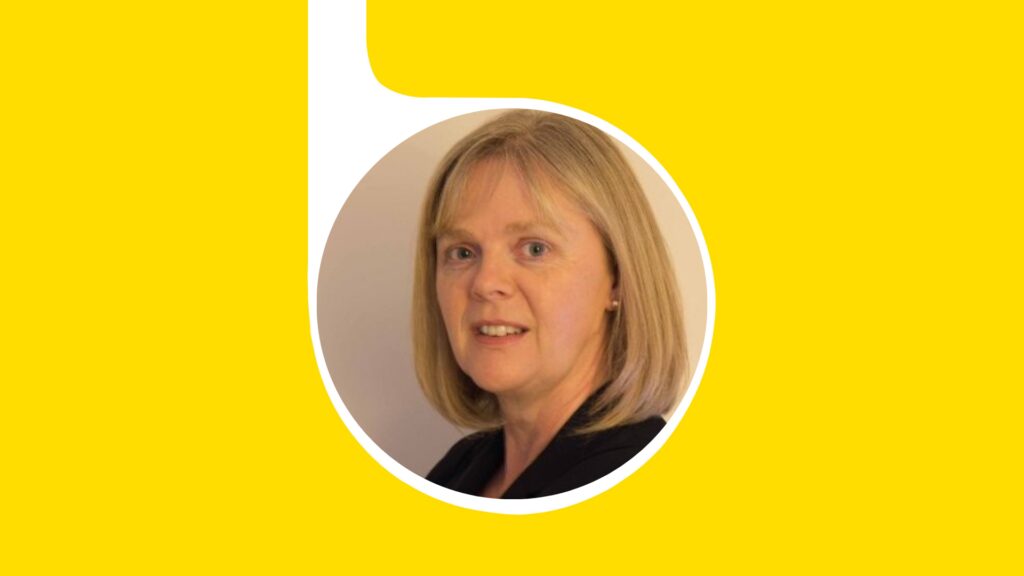Gillian Harford is the Country Executive at the 30% Club Ireland. Prior to this she worked with AIB for 39 years, holding some key roles including Head of HR Strategy & Planning. Gillian tells us how she initially joined AIB for 10 months but walked out of the door just a couple of weeks shy of 40 years after that.
Gillian has had an incredible and fascinating career journey to date, and here in a recent interview with Fionnán O’Sullivan, she shares some insights into her career so far.
In this first part Gillian tells us a little bit about herself, the start of her career in financial services and her career.
FOS: Welcome Gillian and thank you for agreeing to being a guest on our interview series. We’d like to start off with you telling us a little bit about you. We know that you are friends with Nelson Mandela, but can you tell us more about your career in general?
GH: Of course. Well, I did literally bump into Nelson Mandela in a shopping centre in South Africa at one point, which was one of the highlights of my life! Outside of that I can tell you that I’m a woman who joined AIB for 10 months, because I was too young for the college course I wanted to do. I initially joined planning to stay 10 months, but I walked out the door just a couple of weeks shy of 40 years! Following that I started to work with the 30% Club doing some consulting and also working directly with companies on their strategies.
I’d describe myself as quite an ordinary woman, who loves to work, got married, had two kids, and was really lucky when it came to my career in AIB, securing great jobs I always liked doing and working my way through financial services, all the way to the top and never walking away.
FOS: As you mentioned you were too young for a college course; you did end up doing a degree in psychology and economics. Tell us a bit about that.
GH: I did, and sometimes when I talk to people about how it happened, they find it a bit strange! When I joined AIB, back in the late 1970s you had to be under 21 to join so that meant most people joined straight from secondary school based on leaving cert or a commercial course. I joined straight from leaving cert, which was quite unusual for a girl at that point as typically girls joined from a commercial course. That environment meant that the banks were really supportive of further education for those of us who wanted to go beyond the leaving certificate.
I did my bank exams supported by the bank. By then I was based in HR, so I then went on to UCD at night and did psychology and economics for two years. In my final year, which I did on scholarship from AIB, I went back to education full time. Then in 2003 I went back to college and did the MBA, again supported by AIB. So yes, I was constantly looking out for ways for further education, which was done within a really supportive ecosystem within the bank.
FOS: It’s great to see the importance placed on further education, the support provided by AIB and also, it’s interesting that you highlight it was ‘unusual’ for a girl at that point. That leads us nicely to a question about careers in financial services. Do you feel there’s more than one route or path?
GH: Absolutely, one of the great projects that we’ve worked on this year in the 30% Club is specifically focused on financial services (FS) and it’s called a “Career Less Ordinary”. Through it we’re trying to show that jobs in FS aren’t just the narrow ones students think of, like a teller on Grafton Street or a Wall Street trader in a pin striped suit and braces! But in fact, there are lots of different jobs. We’ve also aimed to demonstrate through the programme that you can go into FS straight from school, college or through apprentice schemes – so lots of options.
One of the best things I witness in my role with the 30% Club is the commitment from the financial services industry when it comes to educating you for your next job, not just your current job. I think most FS organisations have a solid training infrastructure and when this is combined with the accreditation and skills programme delivered by the Institute of Bankers to reinforce that, means that as an industry FS invests heavily in people’s education. I suppose for me the key message that stands out is that if you go into FS you can learn and develop into any kind of job really, which makes it a more exciting industry than I think it’s given credit for.
FOS: Taking us back to AIB, tell us more about the start of your career there. Did you land straight into HR?
GH: Most of your audience probably aren’t old enough to remember but in 1979, Ireland broke away from sterling which changed a lot of things in financial services. And the retail banks were doing a lot of recruitment at the time. So as I said, I went in straight from school based on my leaving cert, I went straight into what had been the Barclay Card department. The weekend that I joined, the Barclay Card department became the Visa Card department.
I spent a year and a half there before it grew to be a major department. At the beginning there was 30 of us, and the only new staff joining the team were new entrants so we all had fantastic opportunities to learn to do great jobs.
To give you an example , at 17 years of age, I was running the card issuing aspect of the process and applying credit card limits.
It was a great introduction, because we were all really young and we were working really hard. I started off on a nine to nine, five days a week and Saturdays as well, which was unheard of in banking at that time. But I just got exposed to so many things and then moved to HR at a later stage.
In the next part of this blog series Gillian shares how she moved into HR and the importance of mentors in her career.


 Jump Back
Jump Back

